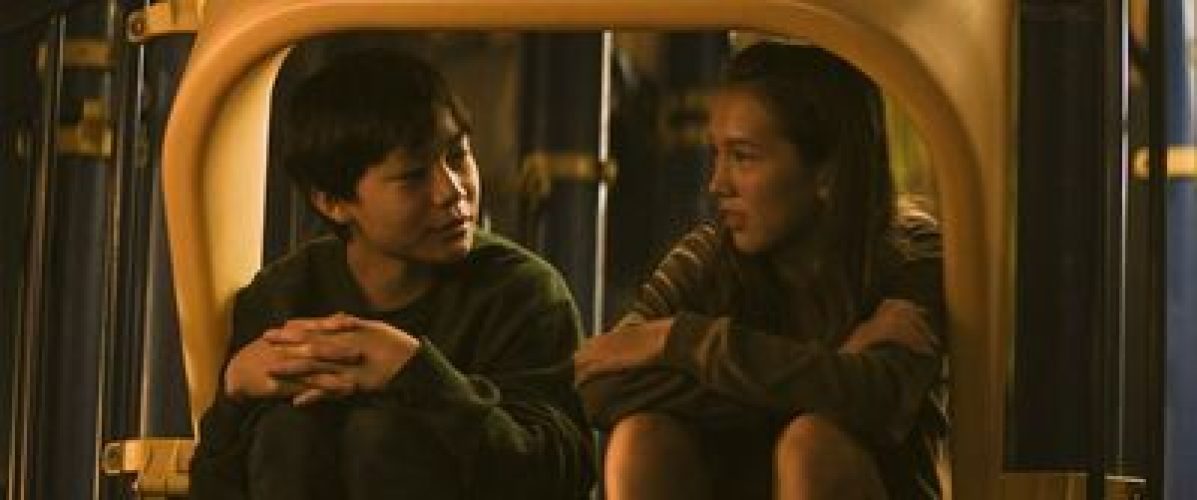It doesn’t happen often, but sometimes I return to a film to discover my initial gut reaction might have been a bit too harsh. When I first watched Sean Wang’s emotionally brutal coming of age film “Didi” at Sundance—where it won the festival’s audience award—I thought his follow-up to his Oscar-nominated animated short (“Nǎi Nai & Wài Pó”) was, at best, a carbon copy of the kind of tropey, saccharine mining of memories that’s become Sundance’s forte. I could see passing references to “Eighth Grade,” “Skate Kitchen,” “Mid90s,” “Minari,” and “Minding the Gap”—better films that seemed to capture their intended spirit with greater urgency and originality. But upon a recent second watch, I have found that “Didi,” his feature directorial debut, is far stronger and far more affecting than I initially gave it credit for.
There are the universal qualities in Wang’s story that just so happens to occur in many of these films: Chris Wang (Isaac Wang)—affectionately called Didi by his mom, but derisively called Wang Wang by everyone else—is on the precipice of high school, soon to encounter all of the growing pains that happen when you pass from adolescence to teendom. He is an outcast in his mostly white Fremont, California enclave. It’s why, tellingly, he surrounds himself with other people of color like Farad (Raul Diad) and Jimmy/Soup (Aaron Chang). But even they’re assimilating into a kind of toxic, white broness that becomes common at that age. Their slow drift away from him, alienates Chris even further.
Chris can’t seem to find love or affection, anywhere, really. He has a crush on a girl named Madi (Mahaela Park), who he befriends at a party and talks with on AOL Instant Messenger. Despite his friends goading him to push his sexual boundaries, Chris, who is still very young, is far too nervous to make the leap. Even in the timid expressions of his inchoate feelings, much is revealed. “You’re pretty cute, for an Asian boy,” Madi, who might have issues with her own identity, backhandedly says. There are many racial slippages in “Didi,” such as Chris telling people he’s only half Asian, or him accusing his doting mom of being too Asian, or the way a group of boys add the word “Asian” to “Chris” when they chant his name. Chris wants to assume the role of boisterous hypermasculine cool kid, but it’s just not him. And when he tries, he comes off as mean, vicious, and just plain hurt.
He blames many people for his perceived shortcomings: His older sister Vivian (Shirley Chen), who is an adversary until she realizes his deep loneliness; his clinging mother, Chungsing (Joan Chen), an aspiring artist who takes flak from her demanding mother-in-law and rebellious kids while her absent husband works in Taiwan; along with his classmates, who simply find him weird. Chris searches for acceptance from a group of older skaters and from his supposed friends at school, but each only reveal inadequacies he perceives in himself.
His personal journey is often rendered through on-the-nose choices, such as the way he uses AOL Instant Messenger, through a bot, to type out the deep, dark insecurities he is too afraid to say aloud. His Nai Nai (Chang Li Hua), a comedic figure representing an older generation’s perception of success and gender roles, is a loose thread that sorta falls away in the film’s second half. While cinematographer Sam A. Davis does well to capture the year 2008—from recreating a camcorder aesthetic to composing luminous compositions that seem to capture the brightness of the California sun—he is sometimes heavy-handed on his use of shadows, to the point of obscuring a touching farewell scene between Chris and Vivian.
“Didi” is at its best when it shakes up this genre’s common visual language. Absurd animation of talking dead fish, a re-animated squirrel and a high dream where figurines from a mini-golf course haunt Chris, are some of the major whimsical departures that give this film its own spin. Those wonderful swings further connect the film with its late-aughts vibe, which recreates everything from early-Facebook to late-era Myspace, and the kind of off-kilter videos that once proliferated the height of Youtube. Throw in some winking references to “The Notebook” and “A Walk to Remember,” along with some flip phones, and even the era, one spurred by the misplaced hope of change, has an unlikely air of nostalgia.
“Didi” also finds further vigor whenever the camera settles on Chen. As Chris’ mother, the actress delivers the slightest twinge of hurt and pang of anger without ever overreaching. It takes a powerful actress to recite a speech you’ve heard in a million other films, such as her major heart-to-heart with Chris, without it ever feeling overly familiar, or, even worse, trite. Chen pulls off that incredible, tender trick with astonishing effortlessness—making for a powerful foil with her younger, but no less impressive co-star Wang. As the final grace notes of “Didi” began to strike, I remembered that I’ve seen this kind of story many, many times before. And yet, I found myself glad to press rewind.
It doesn’t happen often, but sometimes I return to a film to discover my initial gut reaction might have been a bit too harsh. When I first watched Sean Wang’s emotionally brutal coming of age film “Didi” at Sundance—where it won the festival’s audience award—I thought his follow-up to his Oscar-nominated animated short (“Nǎi Nai & Wài Pó”) was, at best, a carbon copy of the kind of tropey, saccharine mining of memories that’s become Sundance’s forte. I could see passing references to “Eighth Grade,” “Skate Kitchen,” “Mid90s,” “Minari,” and “Minding the Gap”—better films that seemed to capture their intended spirit with greater urgency and originality. But upon a recent second watch, I have found that “Didi,” his feature directorial debut, is far stronger and far more affecting than I initially gave it credit for. There are the universal qualities in Wang’s story that just so happens to occur in many of these films: Chris Wang (Isaac Wang)—affectionately called Didi by his mom, but derisively called Wang Wang by everyone else—is on the precipice of high school, soon to encounter all of the growing pains that happen when you pass from adolescence to teendom. He is an outcast in his mostly white Fremont, California enclave. It’s why, tellingly, he surrounds himself with other people of color like Farad (Raul Diad) and Jimmy/Soup (Aaron Chang). But even they’re assimilating into a kind of toxic, white broness that becomes common at that age. Their slow drift away from him, alienates Chris even further. Chris can’t seem to find love or affection, anywhere, really. He has a crush on a girl named Madi (Mahaela Park), who he befriends at a party and talks with on AOL Instant Messenger. Despite his friends goading him to push his sexual boundaries, Chris, who is still very young, is far too nervous to make the leap. Even in the timid expressions of his inchoate feelings, much is revealed. “You’re pretty cute, for an Asian boy,” Madi, who might have issues with her own identity, backhandedly says. There are many racial slippages in “Didi,” such as Chris telling people he’s only half Asian, or him accusing his doting mom of being too Asian, or the way a group of boys add the word “Asian” to “Chris” when they chant his name. Chris wants to assume the role of boisterous hypermasculine cool kid, but it’s just not him. And when he tries, he comes off as mean, vicious, and just plain hurt. He blames many people for his perceived shortcomings: His older sister Vivian (Shirley Chen), who is an adversary until she realizes his deep loneliness; his clinging mother, Chungsing (Joan Chen), an aspiring artist who takes flak from her demanding mother-in-law and rebellious kids while her absent husband works in Taiwan; along with his classmates, who simply find him weird. Chris searches for acceptance from a group of older skaters and from his supposed friends at school, but each only reveal inadequacies he perceives in himself. His personal journey is often rendered through on-the-nose choices, such as the way he uses AOL Instant Messenger, through a bot, to type out the deep, dark insecurities he is too afraid to say aloud. His Nai Nai (Chang Li Hua), a comedic figure representing an older generation’s perception of success and gender roles, is a loose thread that sorta falls away in the film’s second half. While cinematographer Sam A. Davis does well to capture the year 2008—from recreating a camcorder aesthetic to composing luminous compositions that seem to capture the brightness of the California sun—he is sometimes heavy-handed on his use of shadows, to the point of obscuring a touching farewell scene between Chris and Vivian. “Didi” is at its best when it shakes up this genre’s common visual language. Absurd animation of talking dead fish, a re-animated squirrel and a high dream where figurines from a mini-golf course haunt Chris, are some of the major whimsical departures that give this film its own spin. Those wonderful swings further connect the film with its late-aughts vibe, which recreates everything from early-Facebook to late-era Myspace, and the kind of off-kilter videos that once proliferated the height of Youtube. Throw in some winking references to “The Notebook” and “A Walk to Remember,” along with some flip phones, and even the era, one spurred by the misplaced hope of change, has an unlikely air of nostalgia. “Didi” also finds further vigor whenever the camera settles on Chen. As Chris’ mother, the actress delivers the slightest twinge of hurt and pang of anger without ever overreaching. It takes a powerful actress to recite a speech you’ve heard in a million other films, such as her major heart-to-heart with Chris, without it ever feeling overly familiar, or, even worse, trite. Chen pulls off that incredible, tender trick with astonishing effortlessness—making for a powerful foil with her younger, but no less impressive co-star Wang. As the final grace notes of “Didi” began to strike, I remembered that I’ve seen this kind of story many, many times before. And yet, I found myself glad to press rewind. Read More


